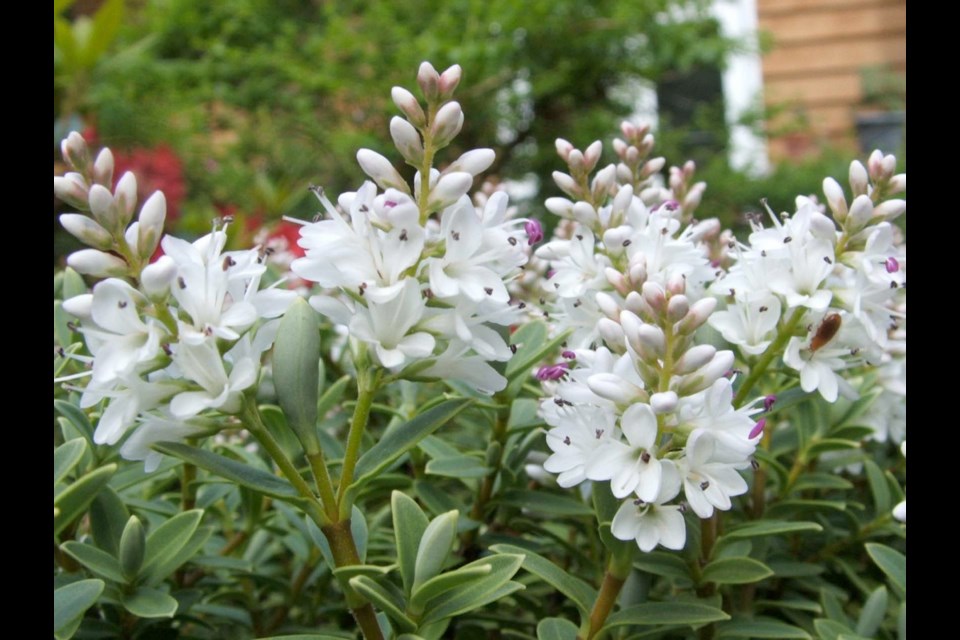Dear Helen: Odd things have happened in my garden this spring. Shrubs that are modestly decorative year round but don’t usually bloom have produced flowers. Have you noticed this in your own or other gardens this year? Also, my spring plantings of spinach and kale have bolted to seed. That does not usually happen either.
G.K.
You are not alone. Just recently a neighbour pointed out shrubs in her garden that almost never bloom but have produced flowers this spring. This can probably be attributed to weather conditions.
In my own garden, around two weeks ago I was astounded to see an old Hebe glaucophylla covered in white. The descriptive term “glaucophylla” refers to the bluish-green leaves. The plant hadn’t bloomed for years. I’d almost forgotten how pretty the little violet-dappled flower spikes were.
This surprise flowering can also be partly attributed to weather, and to pruning. I’ve slowly managed, with help, to accomplish renewal pruning of enough old, congested and overgrown shrubs to allow a clear view across the back garden. And with the extreme pruning came more light. The renovation by pruning has benefitted many of the plantings and enhanced the look of the whole area.
I’ve seen premature bolting to seed in two of my neighbours’ gardens. In Tanya’s new food garden the spinach quickly went to seed early this month, and Kim’s spring kale plants did the same.
It’s the wildly fluctuating weather this spring that triggered the plants to produce flowering stems. A chilly period that followed a fine stretch of warmth was enough to induce the plants’ flowering process — a process called vernalization.
Dear Helen: Can you please tell me what the plant in the attached photo is? We moved to this property last summer, when I was sure the plant was an iris. Should I divide it?
B.G.
Your plant is in the iris family of plants. It’s a Sisyrinchium, a genus of clump-forming plants with sword-shaped leaves and erect stems bearing star-shaped or bell-shaped flowers in spring or summer. The species of your plant is Sisyrinchium striatum. Its common names are pale yellow-eyed grass and yellow Mexican satin flower.
This is an easy-growing perennial in only modestly fertile, dryish, well-drained soils that are neutral to slightly alkaline. Once established, the plants are drought tolerant. They thrive in full sun to light shade.
Your plant does not look overgrown or congested, but I notice that dividing every year or two is recommended, to ensure bountiful flowering. Be sure to remove the flower spikes as soon as the blooms have faded, to avoid unwanted seedlings. Divide as soon as the flowering period is finished.
Dear Helen: Earlier in the month my young tomato plants began being eaten by what I think are flea beetles. They are tiny, black insects. How should I manage them?
E.W.
Tuber flea beetles are tiny, shiny black, fast jumping beetles whose feeding causes little shot-holes in the leaves of potatoes, tomatoes and related plants. The larvae feed in potato tubers.
The first generation of flea beetles is almost sure to appear around tomato transplanting time. Small plants are most vulnerable to severe damage from these insects. Larger plants usually suffer only cosmetic damage.
In my experience, tomato plants of any substance outgrow the damage; however, where populations of the pest are high and transplants are small, floating row covers over the new transplants bar access to the insects and protect the plants while they outgrow the vulnerable stage.
Where large numbers of flea beetles are causing significant damage on small, uncovered and unprotected plants, a pyrethrin spray will help to control adults feeding on the leaves.
Be aware that potato plants that “volunteer” their presence in garden beds and in compost heaps give over-wintered flea beetles a head start on feeding, allowing them to build up damaging populations early in the season. Where flea beetles have been a problem, remove and destroy all volunteer potato plants as soon as they appear.
Plant sale. Ross Bay Villa Society will hold an outdoor plant sale and white elephant sale next Saturday, June 20, from 11 a.m. to 3 p.m. at 1490 Fairfield Rd, to benefit the heritage house museum.



